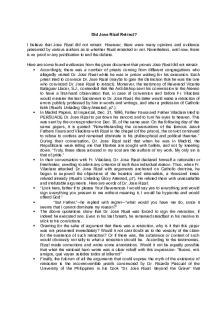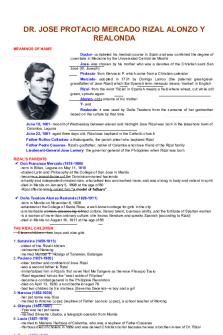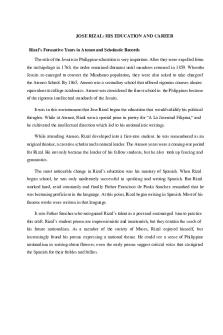Jose Rizal Movie Review PDF

| Title | Jose Rizal Movie Review |
|---|---|
| Author | Aemon Herrera |
| Course | Bachelor of Arts in Journalism |
| Institution | Polytechnic University of the Philippines |
| Pages | 5 |
| File Size | 77.5 KB |
| File Type | |
| Total Downloads | 5 |
| Total Views | 154 |
Summary
Movie Review of the 1998 film 'Jose Rizal.'...
Description
Jose Rizal : A Narrative Critique Background Jose Rizal was a highly recognized film directed by awardwinning director Marilou Diaz-Abaya. Starring Cesar Montano portraying the role of our National Hero, Jose Rizal, this movie, for some, was the best and thought-provoking historical film in the history of the Philippine film industry. The screenplay of the film was written by an eminent Filipino writer, Ricardo Lee, together with Jun Lana and Peter Ong Lim. The film also starred some of the finest and most prominent actors in the industry like Joel Torre as Simoun/Ibarra, Jaime Fabregas as Luis Taviel de Andrade, Gloria Diaz portraying Rizal's Mother, Teodora Alonzo, Gardo Versoza playing the Andres Bonifacio role, and a lot more. It was not also packed with lots of talented actors, but also wellbudgeted, with over 80-million pesos budget, very expensive at that time. Jose Rizal received a lot of wards after it was released on Independence Day and Christmas Day of the year 1998. During the 1998 Metro Manila Film Festival (MMFF), it gains 16 awards including major accolades such as Best Picture, Best Actor for Cesar Montano, Best Director for Marilou Diaz-Abaya, Best Supporting Actors for Jaime Fabregas, Best Actress for Gloria Diaz, and a lot more. The proceeding year, it was recognized again at the 1999 Filipino Academy of Movie Arts and Science (FAMAS), obtaining 11 of the categories. In the same year, Jose Rizal amasses awards from other award-giving bodies such as the 1999 Gawad Urian Award, a wellregarded award that is currently been associated with the United States' New York Film Critic Circle, and the 1999 Star Awards for Movies. Furthermore, the film was also recognized internationally as it was chosen as Official Selection for Panorama in the 1998 Berlin International Film Festival and won 2nd place in the Audience Award of the Toronto Film Fest and the Chicago International Film Festival.
Synopsis Jose Rizal is a history-based film that narrates the life of Rizal, as well as the bitter strife of the Filipino during the Spanish Colonization. The film started with Rizal writing about the hardship of the Filipino under Spanish Rule. As the film begins, Crisostomo Ibarra, the main character from Rizal's novel entitled Noli Me Tangere, was introduced, acting as Rizal's alter ego. Some of the Spanish atrocious acts in his novel like the scene of Filipina being raped by a friar, or of a child being abuse, were depicted and became a representation of the same violence that Rizal had witnessed in the real world. After that, a scene with the Katipunan, headed by Andres Bonifacio was displayed. He was leading the people to revolt against the smothering governance of the Spaniards. The next scenes show how the rumor of Rizal being the initiator of the revolution had reached the Friars, and how they violently interrogated Paciano, Rizal's older brother. After this, Rizal was invited to the Fort Santiago where he was questioned about his involvement with the rising rebellion and about the novel that he had written. This where his struggle in the hands of the Spanish government begun. Then the scene jumped to Rizal's childhood when his brother was involved in the three martyred priests named Gomez, Burgos, and Zamora, and when Rizal started to learn to read and speak Spanish. Rizals were also sent to school to study. His childhood also entails the famous story of his mother about the moth drawn into the flames. Rizal also went to Ateneo to study where he was bullied for his height. This issue about height and superiority was still experienced even when he went to the University of Santo Tomas. Then again the story leaped to the present when Rizal was exiled in Dapitan. This time he talked to Luis Taviel de Andrade, brother of Jose Traviel de Andrade, Rizal's former bodyguard. Taviel introduced himself as Rizal's defender for his case. In their
conversation, they had tackled Rizal's writings especially the part when Ibarra attacked a friar. The story goes on with a flashback about the decision of Paciano for Rizal to study in Madrid, Spain, for him to secure a better education and enough knowledge to help free his land from the oppressors. Aside from this, he also aims to study ophthalmology for him to able to cure his mother's eyes. During this time, he joined a periodic publication known as La Solidaridad. It is with the help of this organization that he was able to continue publishing his works However, he had conflict within the group so he decided to go back to the Philippines. Going back to his motherland, Rizal created the La Liga Filipina, where he met Bonifacio who was so fanatic at that time. At this time, a conflict between the Governor-general and the head of the friar had occurred. This cause the governor-general to lose his position. When Taviel invited Rizal to have a drink, he remembered when he received a letter from his brother about the growing brutality in the Philippines and a letter from Leonor, his former lover, informing him of her wedding. During the wedding, the part from Rizal's novel when Maria Clara became a nun and when she died was also displayed. While Rizal's were reminiscing, Taviel had questioned him about how his second novel had turned out to be so dark unlike the first. He cited the part of the novel where Simon had tried to commit arson at a gathering where the Spanish friars were attending at. Taviel asked if just like Ibarra had change into Simon, did Rizal also change his principles in life. The friar held a banquet where it was shown that the Friars were well-respected by many except Taviel. After this, the day came where Rizal had to defend himself to the court. Unfortunately, the verdict had been decided, Rizal must face death as a punishment for a crime he never did. The news had reached his brother and the Katipunan, to his family. His mother together with his sister immediately visited him in the jail, saying their last goodbyes. Before they leave, requested for them
to accept a stove where he left a small paper containing a 14 stanza poem. Prior to his persecution, Ibarra had shown up, telling Rizal of the chance that he has still had, a chance to change and escape this situation. Rizal seems to realize something so he wrote again. And then the morning came, Rizal braced himself to the impending death that was waiting for him. This part shows how Rizal marched to Bagong bayan to face his end. Together with his death, his family read his poem, telling all his farewells. The movie ends with Bonifacio leading the revolution and the Spaniards starting to fall under their feet. Analsyis Jose Rizal is a very interesting and thought-provoking movie. First, the plot has a very unique way of telling the story. Although it jumps to scenes from the past and the present, it still runs seamlessly. The plot never stays out of track. The way it holds its consistency until the end was very excellent. This consistency could be noticed in the parts when the events in real life were being connected to some parts of Rizal's novel, Noli Me Tangere and El Filibusterismo. This is another great thing about this film. It was fascinating to see two worlds presented like parrallel lines. The scenes from the book never overpowered the real story. In fact, those clips played an important role in the dramatic essence of the plot. Also, I think the filmmakers had made it this way, because they want to show how Rizal wants the readers to perceive his works, as a mirror of what is currently happening during that time. The script was so poetic, every line is a quote to remember. It was written perfectly. It never became discordant to the milieu of the story. Also, every line proceeds to the next line smoothly and naturally. The conversation between Rizal and Taviel was striking. Every word were meaningful and metaphorical. For example, once Taviel said, "Noon pa man ay mahilig ka nang bumangga sa pader (Even then, you always like to hit a wall)" and then Rizal replied, "Lalo na kung and pader ay di nagsasabi ng katotohanan (Especially when the wall does not speak the truth)." The words
were comical and powerful at the same time, and this makes the audience memorialize those lines. The actors were obviously good at their roles. They acted as if they were the character that they portray. It also fascinating that although some of them were pure Filipinos, they were able to speak Spanish fluently, especially the child who played the role of Rizal as a kid. The actors show enough dedication to playing their role right and to make every single line that they deliver reflect the character they hold. All in all Jose Rizal was a great and must-watch film. It never failed to bring the feeling of patriotism to the audiences. Although it has been two decades since the film was first watched, and historical films like Heneral Luna and Goyo: Ang Batang Heneral emerges and more to come, one could still say Jose Rizal still had its same impact on the audience. Jose Rizal: The Movie worth the waste of 3 hours of your time....
Similar Free PDFs

Jose Rizal Movie Review
- 5 Pages

jose rizal movie reflection
- 6 Pages

jose rizal film review
- 3 Pages

Jose Rizal
- 43 Pages

Retraction of Jose Rizal
- 2 Pages

Did Jose Rizal Retract
- 2 Pages

Birth-and-Genealogy JOSE RIZAL
- 6 Pages

Siblings of Jose Rizal LWR
- 8 Pages

Jose Rizal Life and Works
- 35 Pages
Popular Institutions
- Tinajero National High School - Annex
- Politeknik Caltex Riau
- Yokohama City University
- SGT University
- University of Al-Qadisiyah
- Divine Word College of Vigan
- Techniek College Rotterdam
- Universidade de Santiago
- Universiti Teknologi MARA Cawangan Johor Kampus Pasir Gudang
- Poltekkes Kemenkes Yogyakarta
- Baguio City National High School
- Colegio san marcos
- preparatoria uno
- Centro de Bachillerato Tecnológico Industrial y de Servicios No. 107
- Dalian Maritime University
- Quang Trung Secondary School
- Colegio Tecnológico en Informática
- Corporación Regional de Educación Superior
- Grupo CEDVA
- Dar Al Uloom University
- Centro de Estudios Preuniversitarios de la Universidad Nacional de Ingeniería
- 上智大学
- Aakash International School, Nuna Majara
- San Felipe Neri Catholic School
- Kang Chiao International School - New Taipei City
- Misamis Occidental National High School
- Institución Educativa Escuela Normal Juan Ladrilleros
- Kolehiyo ng Pantukan
- Batanes State College
- Instituto Continental
- Sekolah Menengah Kejuruan Kesehatan Kaltara (Tarakan)
- Colegio de La Inmaculada Concepcion - Cebu






